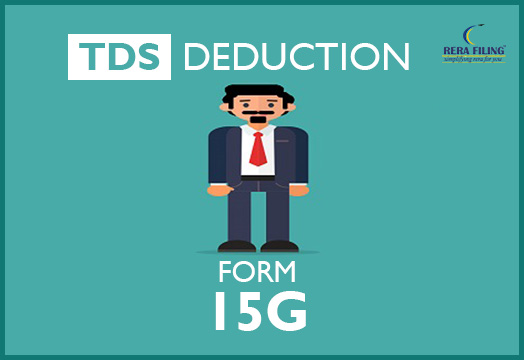Form 15G of the Income Tax Act, 1961

- Thursday 27th June 2019
- Author: Shreya Uppal
Highlights
This is the form which an individual needs to submit to prevent TDS Deduction on the income earned for which some conditions need to be fulfilled. This form is valid for one financial year which needs to be submitted at the beginning of every year. After submitting this, the concerned deductor will not deduct TDS on the interest income.
This is the form which an individual needs to submit to prevent TDS Deduction on the income earned for which some conditions need to be fulfilled. This form is valid for one financial year which needs to be submitted at the beginning of every year. After submitting this, the concerned deductor will not deduct TDS on the interest income.
Conditions which need to be fulfilled:
1. An individual/ HUF/Trust or any other assessee can avail this, not any company or firm.
2. An assessee must be less than 60 years in his age.
3. Tax calculated on the Total income is Nil.
4. The total interest income for the year is less than the basic exemption limit of that year which is Rs. 2.5 lakhs for F/Y 2019-2020.
Purposes for which it can be submitted
These forms can be submitted at other places too which includes:
1. TDS on EPF Withdrawal- TDS is deducted on EPF balance if withdrawn before 5 years of continuous service. If you have had less than 5 years of service and plan to withdraw your EPF balance of more than Rs.50,000 you can submit Form 15G. However, you must fulfill conditions (listed above) to apply for these forms. It means the tax on your total income including EPF balance withdrawn should be nil.
2. TDS on Rent
TDS is deducted on rent exceeding Rs 2.4 lakh annually. If the tax on your total income is nil, you can submit Form 15G to request the tenant to not deduct TDS.
3. TDS on Insurance Commission
TDS is deducted on insurance commission if it exceeds Rs 15000 per financial year. However, insurance agents can submit Form 15G for non-deduction of TDS if the tax on their total income is nil.
How to fill form 15G?
- Name of Assessee (Declarant) – Enter your name as per income tax records
- PAN of the assessee – PAN number as per your PAN card
- Status – Whether you are an individual or HUF
- Previous Year – current financial year for which you are filing up the form
- Residential Status – this form can only be filled by Residents.
- Flat/Door/Block No – details of your address
- Name of Premises – details of your address
- Road/Street/Lane – details of your address
- Area/Locality – details of your address
- Town/City/District – details of your address
- State – details of your address
- PIN – details of your address
- Telephone no.
Various details need to be provided for:
- Estimated income for which declaration is made – sum of income on which TDS should not be deducted
- Estimated total income of the previous year in which income mentioned in column 16 to be included – Calculate your total income from all sources, salary, stipend, interest income, any other income that you have earned during the year. Include the income mentioned in 16, above
- Details of Form 15G other than this form filed during the previous year, if any; the total number of form no 15G filed and the aggregate amount of income for which Form 15G filed – If you have filled Form 15G in the past, mention the total number of Form 15G filed. Also, provide the total income for which Form 15G was filed
- Details of income for which declaration is filed; Identification number of relevant investment/account etc, Nature of Income, Section under which tax is deductible, Amount of income – Provide fixed deposit account number, recurring deposit details, details of NSCs, life insurance policy number, etc. (many of these are chargeable to tax under section 56 of the income tax act)
- Signatures – mention your capacity when signing on behalf of a HUF or AOP
Note:
1. Do not submit the form if such income has to be Clubbed with the income of another person.
2.PAN of the depositor is mandatory.
3. You don’t need to submit these forms directly to the income tax department. Just submit them to the deductor, and they will prepare and submit these forms to the income tax department.
More Articles
- Online Listing Tips for Real Estate Agents
- How to start a Real Estate business in India - a complete guide !
- Renting Vs Buying property - How will you decide?
- What you should do in Property Management services
- Home Loan Insurance
- How to choose your builder?
- How to ensure fire safety in your home!
- Tips To Keep In Mind While Taking A Home On Rent
- Importance of Home Security
- How to plan your property budget?
- Leased vs. Purchased vs. Co-Working Office Spaces
- Easy Tips to Build an Eco Friendly Home
- Sample Flat - A Trick by a Builder?
- How to have a Beautiful Guest Room? Impress your Guests with these Guest Room Ideas..
- Understanding MCLR and its Effects on Home Loans
- 5 simple ways to close a real estate deal
- Is it worth to buy property near an airport ?
- Home loan tax benefit
- How to be successful in business as an introvert
- Cost effective home decor ideas
- What to Be-Paying Guest or a Tenant??
- Complete guide to start your small business
- Sports township- New trend in India
- Online Listing Tips for Real Estate Agents
- Understanding Floor Area Ratio- FAR
- Town and Country Planning | Meaning and Importance
- Checklist of Important Property Documents- All You Need to Know
- Role of CREDAI in real estate
Copyright © 2026 RERA Filing. All rights reserved.

 Rera Act
Rera Act
 Maharashtra
Maharashtra
 Karnataka
Karnataka
 Telangana
Telangana
 Andhra Pradesh
Andhra Pradesh
 Delhi
Delhi
 Uttar Pradesh
Uttar Pradesh
 Haryana
Haryana
 Gujarat
Gujarat
 Bihar
Bihar